Being Happy With The Ordinary, part 1
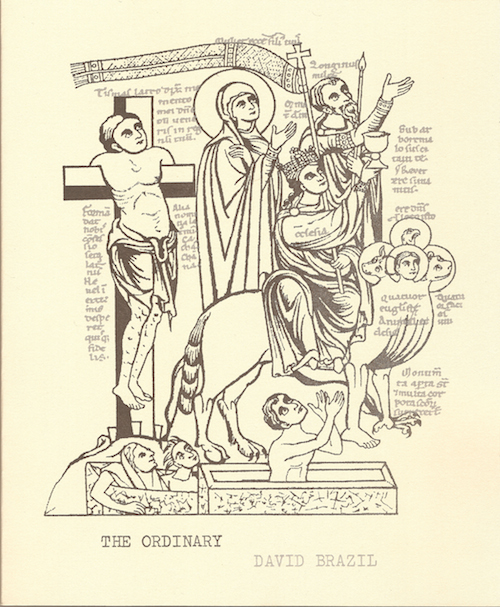
Because I wanted there to be a book by David Brazil, having read his poems and chapbooks with interest, as well as the magazine Try, edited with Sara Larsen, and participated in a year-long reading group at one point, I was happy with The Ordinary before I even saw it. When I did see it I was happier still because of the intriguing religiosity and printerly quality of image on the cover (which is from a medieval codex called "A Garden of Delights”). I like it when people brought up in the West exploit their own traditions and this one is nicely done. The saints, saviors, thieves, graves, action of reaching up or praying, mythical creatures and mothers of god suggest to me not so much delight as a range of Judeo-Christian themes that bring to mind the vicissitudes of personal, family and work life and the politics of everything. Or, more accurately, the politics of everything in this book emerges from the strong sense of community and activism that is true of both David Brazil and his work and which are, in turn, evoked by the human and divine dramas suggested by the cover image. The presence and cultivation of the poetic and other communities, spreading outward with a will to being very inclusive, is pervasive in this book, one could even say foundational. Like the Greek text printed in silver in which the cover images seem embedded, the polis is both frame and ground in this work. The community functions as reader, subject, collaborator, and witness.
Names of people appear on the colophon page which, after giving a timing of 2008-2011 for the composition of the poems in this book and including the address of the author in case you want to write or “stop by…,” mentions Michael Cross, whose Compline produced this lushly designed volume, and who is noted as one without whom “this book, both as concept and object, would never have come into existence.” David thanks Michael and we thank him again for the pleasure to be had in this text. It is a great source of happiness when the ideal publisher steps up to help put together and design the ideal book by some lucky author. Luck or fate is a theme that will appear with some frequency in these poems once we start reading them. But, now, we come to the facing page, the table of contents, which presents the first of the torn things we are to encounter. This page includes an image of a torn piece of paper, in white on the black background with the title, “the ordinary,” along with another torn piece listing the six sections including the page numbers in Roman numerals. These numerals are handwritten and only the perspicacious reader is likely to notice them. This use of Roman numerals for pagination has not been, for me, among the many sources of satisfaction in the book, but they do not distract too much. If here we turn the page, we find two torn sections from the cover image, with the title of the first section, “i. (kairos)” on another image of a torn piece of paper. Turn again to find the first numbered page, III, and a door that brings to mind ancient doors as well as the convention of the door in art and collage going back at least to, well, forever. I am thinking here mostly of evocations of tomb doors that are perhaps from the time of the eighteenth century French invasion of Egypt and other gestures of discovery that were part colonial, part archaeological (if there is a difference between those two things.) The figure in the picture appears to be wearing a fez or is it a top hat? That the image comes from a postcard David bought at the Art Institute of Chicago doesn’t explain much or explains a lot in that it shows the random and ordinary sources for these visual elements. The title of this section “(kairos)” with its interesting parenthesis (consistent throughout the section titles) and with the meaning of “right or opportune moment,” invites us, finally, into what seems to be a poetic diary.
The poetic diary is among my favorite forms. With its evocation of a life lived in poetry, its familiar dailiness, the presence of chance and change, the feeling of development in the thinking of the writer, it combines the pleasure of the author’s journal with the joys of well thought out prosody and very particular word choice. These qualities are all present in “(kairos)” along with the other first thing you notice which is its blot-outs, corrections and generally taped together appearance. The poems here seem to be not “final” but contingent on whether reader and author can agree that these experiments have worked. There is a casual quality to this section belied by the careful wording and, in fact, visible editing. The pieces are all dated like journal entries but without the year. (They date from 2008.) We seem to encounter them mid-way from their start as something like a diary to their final existence as poems. They don’t settle and we are pleased to participate in the on-going account of their alteration. With the writer, we skip the extra words, become more concise, get rid of repetitions and or parts that have “gone threadbare,” not including that phrase, which was retained in a poem that asserts ritual while questioning it, identifies genre as a subject and ends with a line in Sanskrit from the Heart Sutra deeply familiar to those who have gone out from their Judeo Christian roots to Buddhist practice.
9/28
wedding
gone threadbare
to undo genre that we are
in this country, or
the mantra
gate gate paragate parasamgate bodhi sava
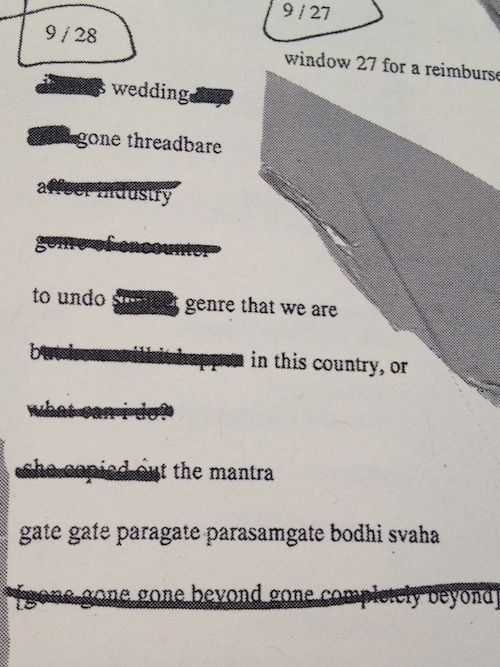
The cross-outs are many in this piece and present, as they do throughout this section, a highly edited, even redacted, text that slows one down a bit as one tries to read some of the more legible crossed out parts and wonders about others. The inclusion of the edits causes the editing to mean. Thinking through what those meanings might be becomes part of one’s slow movement through the poem. I found it a bit distracting and destabilizing but in a pleasing way. My access to this particular poem, due to my own Buddhist practice, and some experience with the genre of weddings, was relatively simple. However, access is not always easy. The image of the door I mentioned before is that of a closed one and yet (see below): “behold I stand at door and knock”.
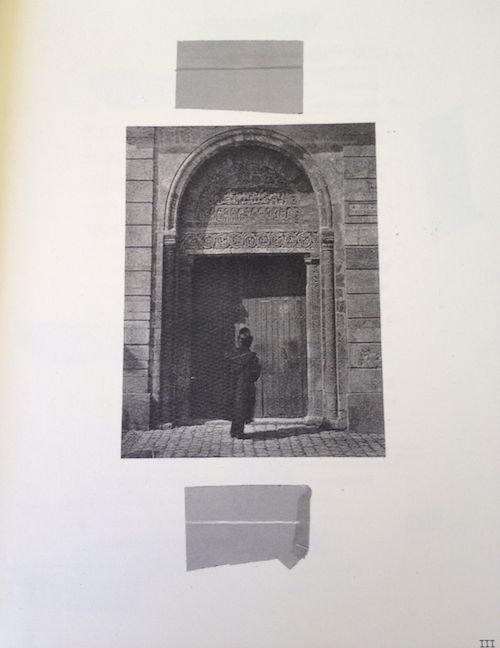
This question of being slowed or distracted brings us to the difficulty and erudition that are some of the particular qualities of Brazil’s work. I thought it was Poundian and, checking with David, found that in fact , this allusiveness is related to his love for the work of Ezra Pound and, I would say, his having in common with Pound a multi-linguality of reading and regard for a wide historical matrix of meaning and cultural context that he wants consistently to include in his work. I make no excuse for it, as David does not and has no reason to. However, it is a challenge to look up a lot of words and phrases as you read, if you choose to read in that way, which is much richer than if you don’t. It is a task for the reader few writers seem to demand these days. Being able to do it online makes it easier but this is not where it comes from with Brazil who, as a bookseller and collector, is all about the material book and is constantly studying ancient languages and traditions—very often with members of the local community and usually at the Bay Area Public School which, it is worth noting, is an arts, political and educational organization in Oakland that grew out of the 2011 Occupy movement and already existing desires for a community space. Brazil helped to found what could be thought of as a sort of “anti-institution” which brings into very active practice his and others’ commitment to community life and thought.
our people is our people
i.e. cash is not the vector
a politics of sufficiency of utterance in this milieu
aint going to fucking cut it
all which has been fastened may be loosened
all that is solid melts into
us
sown into the instruments of time
ducats thy monad
pli selon pli
“cash is not the vector” seems a practical and accurate sentiment in general (and applies specifically to the Bay Area Public School where everything is determinedly free.) This freedom of things and people is central to the Brazil position which tends toward political and spiritual insurrection. Here I am paraphrasing a comment he made in an interview about the writings of Paul of Tarsus that I believe applies equally to David’s thinking. We are next lead into Marx with “all that is solid melts into/ us.” The segue from biblical to Marxian allusion is typical of Brazil. I should have recognized this one right away but had to look it up, as often happens, at least to me. I find that each time I look something up the word or phrases in questions morph into the well-know Blakean expansion of a moment into seven thousand years so the effort becomes a pleasure while remaining an effort. David Brazil requires a lot of work on the part of the reader and/or a lot of knowledge. As I have already mentioned there is no reason to question that demand but, talking with David, I find that he is aware of how such density might limit his readership to people eager to read in this allusive, historical way. The issue is the degree to which one might want to write for readers who don’t have the inclination to read this way. As a writer I like to stay with my reader on the page and so tend not to allude very often but then sometimes I do allude and like it when others make that gesture. As a friend, I would say it is so entirely how David seems to live every moment of his life it is hard to see how he could write otherwise.
The other, larger point, is to notice that for a Marxian to be as religious as Brazil is notable, though, after years of liberation theology, not unique, but there it is. David Brazil’s religiosity is not limited to one tradition but definitely pervades his work and thinking and is actively expressed in his life. There are here issues of belief, of faith and philosophical and political thinking, that are fairly immense in scope. Many of us in the poetic community I have been evoking are determined materialists and atheists but some are not. I think these positions are rarely argued or even mentioned. Perhaps because none of us could imagine that anyone believes in God or a deity or the divine—but belief exists at various levels. And of course there are lines in the thinking of all the writers in question, believer or not, in Marx or God, which are reflected in their poetics. The topic would require a separate essay but, suffice it to say, is operative in reading Brazil’s work.
The last page of “(kairos)” reminded me of Robert Smithson’s “Heap of Language” and, though it is really just a simple rectangle of writing, evoked, for me, the tomb pictured on the facing page. The piece is hand-written and though I could see it was a definition, I had trouble reading the word being defined so I emailed David about it. In his nicely complex and bookish way, he replied “the word is KAIROS, in Greek capitals (the capital 'rho' looks like an English capital P and the final 'sigma' looks like a capital E, otherwise the letters correspond to the Roman alphabet), as defined by the Liddell-Scott-Jones lexicon of ancient Greek & traced out by me on vellum. The 'Liddell' of the lexicon was the father of Alice Liddell, of Wonderland fame.”
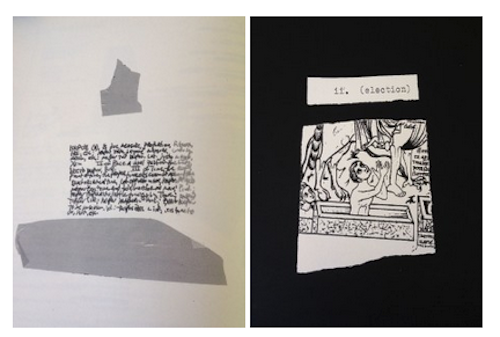
Moving out of “(kairos)” into “(election), “ written around the time of the election of 2008, we find ourselves in the same basic forms as the first section in the sense that they are dated entries edited into poems in a way that remains visible to the reader as blotting, crossouts etc. They are also presented in two columns in what might be 9 point type so that poetry crowds the page. The poems of “(election)” are longer and if you know David (or if you don’t) you find moments of personal history that might remind you of your own life. This focus on the idea of “election” and what that might mean in a writer whose work is intensely nuanced by religious considerations (and belief) drove me back to a talk that Brazil gave at the first Poetics of Labor Conference, in 2010, focusing on senses of vocation. Election and vocation in the Brazil sense seem similar—possibly to be on a continuum. In the talk David quotes a particular passage by Saint Paul in Greek and then Latin and then translates it as “Each one in the calling in which he was called that same calling let him remain.” (from First Corinthians, 7:20) The talk thinks through the fact of being a writer and also a proletarian and how or whether these designations can be commensurate. Unlike “vocation,” “election” can be thought of as a ritual, a secular equivalent of a coronation (not necessarily a positive thing in the Judeo-Christian tradition.) It is the fact of being chosen or, again, called.
This election may involve more suffering and responsibility than anything else but does, at times, involve the populace. After the image of the body rising from a tomb taken from the front cover print, the second image that confronts the reader in “(election)” is a detail of the body of the sovereign made up of the people from the well-known frontispiece of Thomas Hobbes’ Leviathan or The Matter, Forme and Power of a Common Wealth Ecclesiasticall and Civil by the printmaker Abraham Bosse. These mostly faceless people (they are all turned toward the sovereign though they are already part of him) seem unhappily captured and incorporated into this autocratic body politic. The poems here are haunted by death and debt. There is doubt. There are a terrific number of cross-outs so that the work seems to be unwriting itself right before your eyes. The second column of a piece on page XLIII speaks to the atmosphere that pervades “(election)” as well as to the prosodic pleasure to be had here.
possible horizon’s
innovation of a subject in relation to
what once was god
what now is cash & debt
the king’s head hangs in tree
a space devoid of law
where grace had not
discernable place
that dogma fails
“o tome, o tomb, I hum a hym
to home, to whom”
In spite of the high level of erudition and even occasional opacity, there is a great clarity of meaning and passion in this Gethsemane-like section. You don’t have to be a scholar to get that the “silent void through which/ vocation floods” might not always be a good place to be. Of course for the reader, as always, the difficulty faced by the protagonist and offered up by the poet as a part of his journey is a pleasure to experience and there is a great deal of fun with prosody to be had here. Part of Brazil’s prosodic approach is to work through the sound of the word which typically leads to an assertion of its etymology. Often the source language will slide into the picture and there might then be a rhyme or a pun or other sound-based way of moving forward. Often there are bits of conversation. There might be a quote from an ancient text or from a headline. The line might be a complaint or cry of sadness but the music of it carries you. The activity of making one’s way through these densities brings us back to my happiness theme because there simply isn’t a way to make me happier as a reader than difficulty which resolves into delightful song-like clarity. The last page of “(election)” which is the last part of a three page poem demonstrates this artfulness, simplicity and explanation:
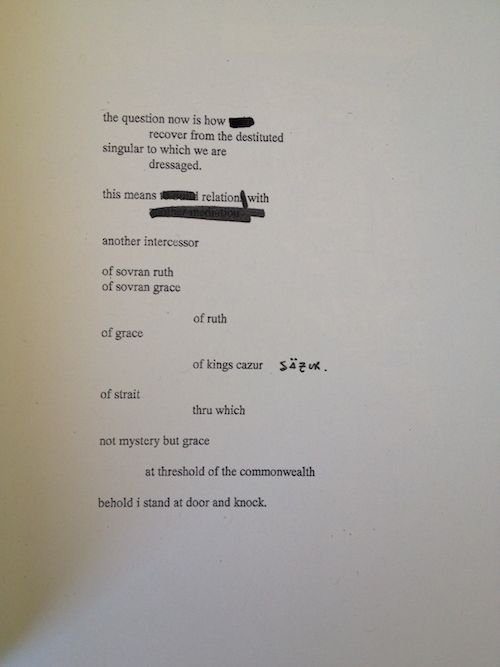
The third section “(vierges)” begins with the image of a young woman wearing a dress and a wimple by an engraver called Martin Schongauer. The print is presented as a Xeroxed image against a gray Xeroxed background. She prepares us for a text in which the feminine appears in relation to the citizenship being examined and proposed. Each poem occupies one page and is not left- justified. The material of this particular section—both in its typing and in its reproduction as image rather than as words that are typeset—is consistent with the first two sections. Here there is a noticeably inconsistent leading (distance between lines) that would cause you to have your typewriter repaired if there are still people who could do that and you weren’t going for just that effect. In this case, the lines wander intentionally with meanings in tow.
Still, because there are no visible editings or blottings you begin the section with the sense that it will be smooth sailing. The way through these poems, however, remains nicely oblique. Without the dailiness of the journal-like pieces or as much vernacular language, I found less linearity and a more meditative way of presenting the matter, “(vierges),” which is not so much virginity, the literal translation, as, again, citizenship, particularly as it relates to what Brazil called, in an email exchange we had about this section, “the question of the feminine.” This is a question not often addressed by male writers in a way that does not characterize this feminine as a lover, wife, sister or mother, so its presence here is, for me, a welcome one. As a “subject gendered male” living with the heritage of many patriarchal empires that are both actual and conceptual and which include the current one, Brazil sets out to “perceive and demonstrate” what it might mean to live as one “of the vanquished/ with a short or long ‘true life’/and role of arbiter/emended words/having a common assumption/o’er took with envy’s storm/called ‘invisible being’/ appealing to isonomy/--unjust judgments—“ (LXIV) “Isonomy” is “the possession of equal political and legal rights by all citizens of a state or equality before the law. The degree to which such a thing is entirely utopian is underlined by David’s comment about this section is that it has “in common with other sections of the book a concern with perceiving and demonstrating the strata of civic constitution -- in order that we can imagine an alternative ‘step by step, into the sacred world.’”
(vierges) ends with an image by the same artist of a young woman facing in the opposite direction. “iv (descorts)” begins with a print of an old man, bearded, with a crucifix before him and a rosary hanging behind. The image is from a study for an engraving of Jerome by Albrecht Dürer. The first poem in this section begins on the left instead of the right page, suggesting the saint is the first poem. Again, we have reproduced typescript which includes edits. The word “posits” appears (with a blot between the “s” and the “I”) as a verse and below it in a square of Xeroxed gray. One is immediately put in mind of Jack Spicer’s iconic Heads of the Town Up to the Aether with its upper level sections in black ink and its lower, commentary sections in gray. Brazil’s work here asserts a much more gnomic presence, to use a term David favors and by which I mean brief, allusive and understated. So we have something posited here by “descorts,” a form and genre of Occitan lyric poetry that was discordant. My reading is that it is prosody itself that posits or proposes but when we ask what is posited we find a verse “heaven/of the/ fixed stars” cancelled by a very stellar, hand drawn “X” that brings us to Dante’s Eighth level of paradise and to the constellative impulse to which these highly prosodized syntactic units (to use a term I invented for the contemporary anti-lyric) are subject.
What is apparently in mind in the pieces in this section is first the urge to experiment with prosody so wildly as to push the limits of meaning well past what might seem wise and yet retain a sense that these words should be arranged in just this way at this time on the page as you find them. It is an activity familiar to me and I think this kind of practice requires the also urgent need to communicate where, as here, the matter to be communicated is a sense of the ordinary life of love and death, and the politics of scarcity and catastrophe, both in the world and in the heart.
THERE
Is a transmission
that is catastrophe
circumcised
heart
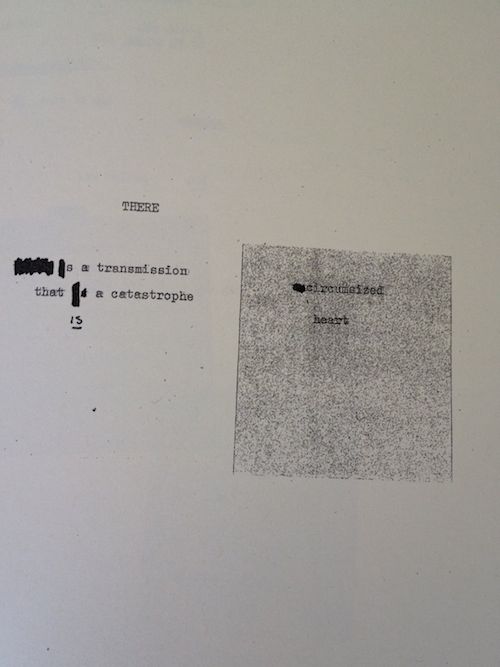
This is the first of many appearances of the phrase “circumcised heart”—one, as I read it, that has been cut around, surrounded, altered according to an old ritual that remains current. The phrase causes religion, identity, gender, sexuality, love and belief to meet in a way that changes as it is used and read. I assumed David had invented it until I noticed in some reading I was doing a source in Deuteronomy 30:6 as well as Romans 2:29. The concept in a religious sense seems to be that actual circumcision doesn’t trump what is called circumcision of the spirit. Again, this seems to have to do with who is chosen, what they are chosen to do or be and how they might know that.
“iii (descorts)” ends with a full page of intensely sounded lines that source various languages, taking the form, at times, of syllables or phonemes “ret,” “wert,” “hyle” that don’t immediately mean to the common reader though there is a kind of throughline in these words, phrases and fragments suggestive of a sensual and possibly Oedipal context that might involve licking. The last line of the first section “vegy/asafetida/lickerisher/potate” is followed by the lines in the Xeroxed square in what I have thought of as the commentary section which, in this case, is “avalo/kiteshvara” with underlinings ( suggesting perhaps ital). This phrase is a Sanskrit term which can be thought of in English as something like “Lord who looks down on the world,” a highly revered Bodhisattva who in some traditions is said to have made a vow to postpone his own enlightenment until he assists all sentient beings to that state. This Christ-like figure is one of many in The Ordinary.
Born in St. Paul, Minnesota, poet and novelist Laura Moriarty grew up in Cape Cod and northern California…
Read Full Biography

